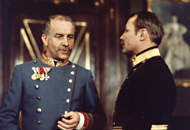Lord Chandos
Part of what I find so fascinating about Lord Chandos' dilemma is that while he, as a poet or writer, finds himself incapable of working, he seems to have entered the most sensitive state of his life. Both the mundane and the removed suddenly have great impact on his thoughts and emotions, like the dying cries of the poisoned rats or the affairs of other people (which he now considers as being terrifyingly close to him). As someone who considers himself an artist the inability to articulate this heightened sensitivity is understandably maddening. It is in aesthetical crisis because he is experiencing such an acute shift in perspective, a psychological crisis because his is unable to articulate his experiences, and an ethical crisis because he finds himself most worried misrepresentation and the truth of his words. It is difficult for me to ponder Ulrich's potential responses to his letter, but I do think that Chandos could benefit from his rational perspective. Perhaps this is why Chandos is writing to the father of empiricism. There is a sense in which I feel that Ulrich's childhood friend Walter is suffering a similar crisis, have yet to see if or how Ulrich addresses it.



1 comment:
I feel as though Ulrich has almost, without knowing it, experienced an epiffany. He was looking at the world in a certain way, and then for some unknown reason, he now has new perspective. With this new outlook, he can't seem to make things "fit" into the categories he had once put them in, and it scares him. He feels unable to express himself. I wonder what it might have been that changed in him...
Post a Comment